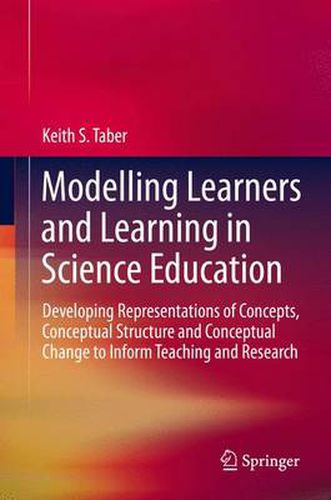Readings Newsletter
Become a Readings Member to make your shopping experience even easier.
Sign in or sign up for free!
You’re not far away from qualifying for FREE standard shipping within Australia
You’ve qualified for FREE standard shipping within Australia
The cart is loading…






This title is printed to order. This book may have been self-published. If so, we cannot guarantee the quality of the content. In the main most books will have gone through the editing process however some may not. We therefore suggest that you be aware of this before ordering this book. If in doubt check either the author or publisher’s details as we are unable to accept any returns unless they are faulty. Please contact us if you have any questions.
This book sets out the necessary processes and challenges involved in modeling student thinking, understanding and learning. The chapters look at the centrality of models for knowledge claims in science education and explore the modeling of mental processes, knowledge, cognitive development and conceptual learning. The conclusion outlines significant implications for science teachers and those researching in this field.
This highly useful work provides models of scientific thinking from different field and analyses the processes by which we can arrive at claims about the minds of others. The author highlights the logical impossibility of ever knowing for sure what someone else knows, understands or thinks, and makes the case that researchers in science education need to be much more explicit about the extent to which research onto learners’ ideas in science is necessarily a process of developing models.
Through this book we learn that research reports should acknowledge the role of modeling and avoid making claims that are much less tentative than is justified as this can lead to misleading and sometimes contrary findings in the literature. In everyday life we commonly take it for granted that finding out what another knows or thinks is a relatively trivial or straightforward process. We come to take the ‘mental register’ (the way we talk about the ‘contents’ of minds) for granted and so teachers and researchers may readily underestimate the challenges involved in their work.
$9.00 standard shipping within Australia
FREE standard shipping within Australia for orders over $100.00
Express & International shipping calculated at checkout
This title is printed to order. This book may have been self-published. If so, we cannot guarantee the quality of the content. In the main most books will have gone through the editing process however some may not. We therefore suggest that you be aware of this before ordering this book. If in doubt check either the author or publisher’s details as we are unable to accept any returns unless they are faulty. Please contact us if you have any questions.
This book sets out the necessary processes and challenges involved in modeling student thinking, understanding and learning. The chapters look at the centrality of models for knowledge claims in science education and explore the modeling of mental processes, knowledge, cognitive development and conceptual learning. The conclusion outlines significant implications for science teachers and those researching in this field.
This highly useful work provides models of scientific thinking from different field and analyses the processes by which we can arrive at claims about the minds of others. The author highlights the logical impossibility of ever knowing for sure what someone else knows, understands or thinks, and makes the case that researchers in science education need to be much more explicit about the extent to which research onto learners’ ideas in science is necessarily a process of developing models.
Through this book we learn that research reports should acknowledge the role of modeling and avoid making claims that are much less tentative than is justified as this can lead to misleading and sometimes contrary findings in the literature. In everyday life we commonly take it for granted that finding out what another knows or thinks is a relatively trivial or straightforward process. We come to take the ‘mental register’ (the way we talk about the ‘contents’ of minds) for granted and so teachers and researchers may readily underestimate the challenges involved in their work.